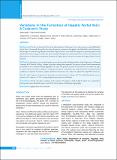Please use this identifier to cite or link to this item:
https://hdl.handle.net/20.500.14356/1268Full metadata record
| DC Field | Value | Language |
|---|---|---|
| dc.contributor.author | Kadel, Muna | - |
| dc.contributor.author | Pandit, Tinku Kumari | - |
| dc.date.accessioned | 2023-05-04T06:48:40Z | - |
| dc.date.available | 2023-05-04T06:48:40Z | - |
| dc.date.issued | 2020 | - |
| dc.identifier.citation | KadelM., & PanditT. K. (2020). Variations in the Formation of Hepatic Portal Vein: A Cadaveric Study. Journal of Nepal Health Research Council, 18(2), 224-227. https://doi.org/10.33314/jnhrc.v18i2.2421 | en_US |
| dc.identifier.issn | Print ISSN: 1727-5482; Online ISSN: 1999-6217 | - |
| dc.identifier.uri | http://103.69.126.140:8080/handle/20.500.14356/1268 | - |
| dc.description | Original Article | en_US |
| dc.description.abstract | Abstract Background: Portal vein drains blood from the abdominal part of alimentary tract, spleen, pancreas and gall bladder to the liver. It is normally formed by the union of superior mesenteric and splenic veins behind the neck of pancreas. Knowledge of variations regarding the formation of portal vein is very useful for surgeons to perform pancreas and duodenum and liver surgeries and for the interventional radiologist for catheter-based interventions. The objectives of this study are to disclose the variations in formation of hepatic portal vein and to measure the length of portal vein in cadavers. Methods: A descriptive cross sectional study was carried out on 40 embalmed cadavers in the Department of Human Anatomy, KIST Medical College, Lalitpur Nepal after taking ethical approval. The pattern of portal vein formation and its tributaries were identified and photographs were taken. The pattern of portal vein formation was classified as: Type I: Portal vein formed by the confluence of superior mesenteric and splenic vein ; Type II: portal vein formed by the confluence of superior mesenteric, splenic and inferior mesenteric vein . Data was analyzed by using SPSS version 20. Results: Type I pattern of portal vein formation was observed in 31 cadavers (82.5%) while Type II pattern was observed in 5 cadavers (12.5%). Average length of portal vein was 50.58mm. Conclusions: Portal vein shows variations in the pattern of formation which should be taken into consideration during pancreatico-duodenal surgeries and in the interpretation of abdominal angiographs. Keywords: Length; portal vein; variations. | en_US |
| dc.language.iso | en | en_US |
| dc.publisher | Nepal Health Research Council | en_US |
| dc.relation.ispartofseries | Apr-June, 2020;2421 | - |
| dc.subject | Length | en_US |
| dc.subject | portal vein | en_US |
| dc.subject | variations | en_US |
| dc.title | Variations in the Formation of Hepatic Portal Vein: A Cadaveric Study | en_US |
| dc.type | Journal Article | en_US |
| local.journal.category | Original Article | - |
| Appears in Collections: | Vol. 18 No. 2 Issue 47 Apr-Jun 2020 | |
Files in This Item:
| File | Description | Size | Format | |
|---|---|---|---|---|
| 2421-Manuscript-17520-1-10-20200911.pdf | Fulltext Download | 358.58 kB | Adobe PDF |  View/Open |
Items in DSpace are protected by copyright, with all rights reserved, unless otherwise indicated.
